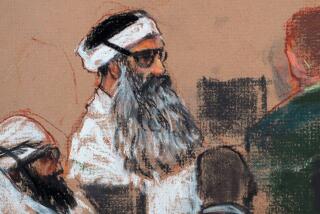U.S. Pressure Pays Off
- Share via
Counter-terrorism agents sought Khalid Shaikh Mohammed for years and redoubled their efforts when he claimed responsibility for the Sept. 11 attacks on the World Trade Center and the Pentagon. His capture Saturday in Pakistan will diminish, though not eliminate, Al Qaeda’s ability to dump anthrax into San Francisco’s Bay Area Rapid Transit system or ignite a dirty bomb in London.
The raid that netted Mohammed is a tribute to U.S. and Pakistani forces, which have combined in the last year and a half to round up potential mass murderers. Authorities call Mohammed, their biggest catch so far, the brains behind many Al Qaeda atrocities, including the slaughter of 20 people, 14 Germans among them, at a Tunisian synagogue last year.
Mohammed allegedly worked hard after Sept. 11 to plot attacks and reestablish Al Qaeda after the United States and its allies battered the terrorist network’s Taliban protectors in Afghanistan. His arrest further weakens what’s left of Osama bin Laden’s scattered band of Islamist militants.
The weekend success should remind the Bush administration why it needs international help to hobble not just renegade terror groups like Al Qaeda but rogue nations such as Iraq. Mohammed’s capture should encourage the delicate diplomacy needed to gain and keep other nations’ support in disarming Baghdad. Here, though, the administration flounders as Defense Secretary Donald H. Rumsfeld keeps blurting ill-considered remarks about nations opposed to the administration’s Iraq policy -- especially France and Germany.
The latest example of Bush administration pressure boomeranging came with the Turkish parliament’s vote Saturday. Vice President Dick Cheney needed to seduce the Turks. His courtship by arm-twisting merely galled them. They voted against letting U.S. troops use the country as a springboard into Iraq in the event of war.
Turkey may vote again and back Washington. Meanwhile, Iraq’s weekend decision to begin destroying missiles banned by the United Nations should give all nations breathing room -- as should Arab nations’ growing call for Saddam Hussein to step aside.
No one should forget that it took the massing of nearly 200,000 troops in the region for Hussein to grudgingly ‘fess up after 12 years of coy denials. Now that the threat is working, the U.S. should keep up the pressure. By refraining from an attack on Iraq, Washington gains time to win over countries that may loathe Hussein’s repressive dictatorship but say there’s no evidence that he’s an imminent threat to world peace.
If Hussein again dodges and weaves, the United Nations will have a hard time not stepping in with force. If Iraq does indeed disarm, or if Hussein steps aside, President Bush will have won a war without firing a shot.
More to Read
Sign up for Essential California
The most important California stories and recommendations in your inbox every morning.
You may occasionally receive promotional content from the Los Angeles Times.










